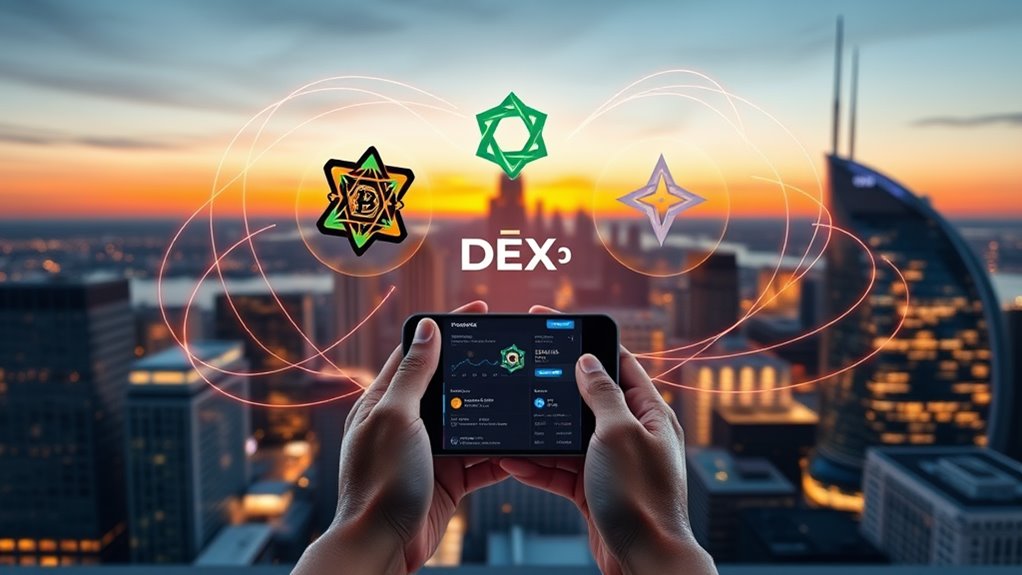
Top Decentralized Exchanges: How They Work & Why You Need Them
Decentralized exchanges (DEXs) offer peer-to-peer crypto trading without intermediaries, using blockchain smart contracts to execute transactions. Top platforms include Uniswap, Raydium, Orca, SushiSwap, and Aerodrome Slipstream. DEXs provide enhanced security through self-custody, greater privacy with no KYC requirements, global accessibility, and reduced fees compared to centralized alternatives. Users maintain control of their private keys, eliminating counterparty risk and single points of failure. These advantages represent the growing shift toward trustless financial systems.
Key Takeaways
- Decentralized exchanges like Uniswap execute peer-to-peer trades through smart contracts without third-party custody of funds.
- DEXs eliminate KYC requirements and geographical restrictions, allowing anonymous trading access to users worldwide.
- Users maintain control of their private keys and assets, reducing risks associated with centralized exchange hacks.
- Leading platforms include Uniswap ($4.2B daily volume), Raydium ($508M), and Orca ($709M) with varying blockchain compatibility.
- DEXs typically offer lower fees than centralized exchanges while removing counterparty risk through immutable smart contracts.
The Rise of Decentralized Exchanges in Modern Crypto Trading

As the cryptocurrency ecosystem has matured over the past decade, decentralized exchanges have emerged as a fundamental alternative to traditional centralized trading platforms.
These innovative systems leverage blockchain technology and smart contracts to facilitate peer-to-peer transactions without intermediaries, putting users in control of their assets.
DEXs offer significant advantages over their centralized counterparts, including enhanced security through self-custody, global accessibility regardless of location, reduced fees, and increased privacy without KYC requirements.
The trustless nature of these platforms eliminates counterparty risk, as trades execute directly between participants through automated smart contracts.
While early DEXs struggled with usability and liquidity issues, recent technological advancements in scaling solutions and liquidity models have dramatically improved their functionality, attracting both retail traders and institutional participants to these permissionless trading environments. Furthermore, the growing popularity of decentralized exchanges is driven by their ability to provide higher privacy and lower fees compared to centralized exchanges.
Five Leading DEXs Transforming the Crypto Marketplace

While the decentralized exchange landscape continues to evolve rapidly, five platforms have distinguished themselves through innovation, volume, and user adoption.
Uniswap leads with $4.2 billion in daily volume and support for over 34 chains, capturing 19% of total DEX market share.
Uniswap dominates the DEX landscape with massive volume and extensive multi-chain support, controlling nearly one-fifth of the market.
On Solana, Raydium and Orca process significant volumes ($508 million and $709 million respectively), with Raydium leveraging Serum’s order books for high-speed trading.
SushiSwap offers multi-chain functionality across 38 networks, though with more modest volume at $68 million daily.
The newcomer Aerodrome Slipstream has quickly gained traction on Base chain with $358 million in daily volume and $657.7 million TVL, featuring zero-fee architecture and native liquidity mining to attract users. This growth reflects the broader trend of decentralized finance reshaping traditional financial systems.
Behind the Technology: How DEX Smart Contracts Protect Your Assets

How exactly do decentralized exchanges safeguard user assets without traditional intermediaries? The answer lies in their smart contract architecture, which automates transactions directly on the blockchain without human intervention.
These immutable, transparent contracts eliminate counterparty risk while ensuring accurate trade execution.
Smart contracts incorporate multiple layers of security:
- Code audits and formal verification identify vulnerabilities before deployment.
- Cryptographic wallet integration requires private key signatures for all transactions.
- Permission-based transactions force users to explicitly approve token spending limits.
While smart contracts aren’t without challenges—including potential undiscovered vulnerabilities and cross-chain risks—their design considerably reduces the security concerns associated with centralized exchanges. Additionally, implementing multi-factor authentication (MFA) can further enhance the security of user transactions within decentralized platforms.
Users maintain control of their private keys throughout the trading process, eliminating the need to trust a third party with custody of their assets.
Key Advantages of Trading on DEXs vs. Centralized Platforms

Decentralized exchanges (DEXs) offer several compelling advantages over their centralized counterparts that have driven their growing popularity among cryptocurrency traders.
The self-custody model guarantees users maintain control of their assets through non-custodial wallets, eliminating the risks associated with centralized storage.
DEXs provide enhanced privacy by typically not requiring KYC verification, allowing users to trade anonymously. The permissionless nature removes geographical barriers and restrictions, making them accessible globally. Traders can access unique, early-stage tokens before they reach centralized platforms.
The absence of deposit and withdrawal fees, combined with generally lower trading fees, makes DEXs more cost-effective for many users.
Additionally, DEXs eliminate single points of failure, reducing hack risks through their distributed architecture and smart contract security. Moreover, many DEXs implement escrow services to enhance transaction security, ensuring that trades are executed safely between parties.
Security Best Practices When Using Decentralized Exchanges

Safeguarding digital assets requires vigilant attention to security when engaging with decentralized exchanges. Users must properly manage their private keys and consider hardware wallets for offline storage to minimize unauthorized access risks.
Researching platforms before trading guarantees engagement with reputable DEXs that implement robust security measures.
Due diligence in platform selection ensures participation with trusted DEXs maintaining strong security frameworks.
For maximum protection when using decentralized exchanges, users should:
- Enable multi-factor authentication whenever available to add an additional verification layer.
- Remain alert to phishing attempts targeting private keys through fraudulent websites or communications.
- Understand liquidity risks and impermanent loss potential, especially when providing liquidity to trading pools.
Smart contract security remains fundamental to DEX integrity, with regular third-party audits identifying vulnerabilities before they can be exploited. Additionally, users should keep their software and apps up to date to ensure they benefit from the latest security patches.
Features like multi-signature authentication and reentrancy protection further strengthen these platforms against potential attacks.
Frequently Asked Questions
Can DEXS Support Trading Between Different Blockchains Directly?
Cross-chain DEXs facilitate direct trading between different blockchains through interoperability protocols like atomic swaps and bridges. These mechanisms lock assets on one chain while issuing equivalent tokens on another, enabling seamless inter-blockchain transactions.
How Are DEX Tokens Different From the Cryptocurrencies They Help Trade?
While cryptocurrencies represent value for trading, DEX tokens serve platform-specific functions. They enable governance, incentivize liquidity provision, and facilitate operations within the exchange, deriving value primarily from the platform’s utility and adoption.
What Happens if a Blockchain Network Goes Down During Trading?
When a blockchain network experiences downtime during trading, users face transaction delays or failures, inaccessible funds, missed opportunities, and potential financial losses. Decentralized exchanges may offer more resilience than centralized platforms during outages.
Are DEX Transaction Fees Tax-Deductible in Most Jurisdictions?
Like travelers seeking refuge from taxation’s storm, DEX transaction fees are generally tax-deductible in most jurisdictions when related to acquiring, disposing of, or exchanging cryptocurrencies, typically counted as part of the cost basis.
Can Institutional Investors Use DEXS for Large-Volume Trading Effectively?
Institutional investors can utilize DEXs for large-volume trading, though challenges persist with liquidity fragmentation and slippage. Aggregation tools and advancing infrastructure are gradually improving feasibility for substantial transactions in decentralized environments.
Conclusion
As cryptocurrency evolves, decentralized exchanges stand as beacons in a sea of financial uncertainty. Like digital lighthouses, DEXs guide traders toward greater control and security, illuminating paths traditional exchanges cannot. While challenges remain, the technology’s foundation grows stronger daily. For those traversing crypto’s complex waters, understanding these platforms isn’t merely beneficial—it’s increasingly essential for safely charting one’s financial journey through this digital frontier.














